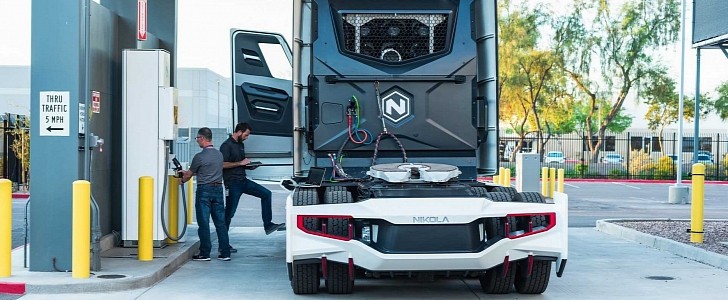After delivering an electric truck before Tesla managed to start producing the Semi, Nikola may have reached another crucial point in its history: getting rid of fraud accusations with the U.S. SEC (Securities and Exchange Commission). The only issue is that it was not cheap: the company agreed to pay $125 million to settle the charges.
SEC makes it clear that most accusations have to do with Trevor Milton’s behavior. The commission states that “before Nikola had produced a single commercial product, Milton embarked on a public relations campaign aimed at inflating and maintaining Nikola’s stock price.”
The Nikola founder would have done that with “statements in tweets and media appearances” that “falsely gave investors the impression that Nikola had reached certain product and technological milestones.” SEC was pretty comprehensive in pointing out everything Milton would have done.
The commission states that he lied about “in-house production capabilities, hydrogen production, truck reservations and orders,” “financial outlook,” “the refueling time of its prototype vehicles, the status of its headquarters’ hydrogen station, the anticipated cost and sources of electricity for its planned hydrogen production, and the economic risks and benefits associated with its contemplated partnership with a leading auto manufacturer.”
The reference here is to the deal Nikola had with General Motors. When it was announced, it gave Nikola a sort of a trust seal. After all, GM would not associate with a company or with an entrepreneur making false claims, right?
When Hindenburg Research released its demolishing report on Nikola, GM’s due diligence department was questioned, and the deal was quickly revised. Instead of investing in Nikola and producing the Badger pickup truck for the startup, GM only allowed it to use its Hydrotec fuel cells in a non-binding agreement.
By putting these fraud accusations behind it, Nikola may be finally free to celebrate delivering its first trucks, developing its fuel cell semi-trucks, and even trying to establish the hydrogen refueling network necessary for its trucks to run around the U.S. Too bad for it that it will lack $125 million that could be better used in research and development.
The Nikola founder would have done that with “statements in tweets and media appearances” that “falsely gave investors the impression that Nikola had reached certain product and technological milestones.” SEC was pretty comprehensive in pointing out everything Milton would have done.
The commission states that he lied about “in-house production capabilities, hydrogen production, truck reservations and orders,” “financial outlook,” “the refueling time of its prototype vehicles, the status of its headquarters’ hydrogen station, the anticipated cost and sources of electricity for its planned hydrogen production, and the economic risks and benefits associated with its contemplated partnership with a leading auto manufacturer.”
The reference here is to the deal Nikola had with General Motors. When it was announced, it gave Nikola a sort of a trust seal. After all, GM would not associate with a company or with an entrepreneur making false claims, right?
When Hindenburg Research released its demolishing report on Nikola, GM’s due diligence department was questioned, and the deal was quickly revised. Instead of investing in Nikola and producing the Badger pickup truck for the startup, GM only allowed it to use its Hydrotec fuel cells in a non-binding agreement.
By putting these fraud accusations behind it, Nikola may be finally free to celebrate delivering its first trucks, developing its fuel cell semi-trucks, and even trying to establish the hydrogen refueling network necessary for its trucks to run around the U.S. Too bad for it that it will lack $125 million that could be better used in research and development.















